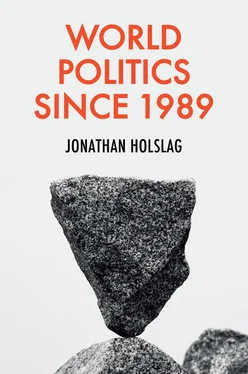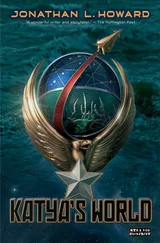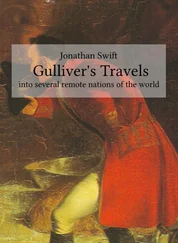1 Cover
2 Endorsement “Important and timely.” James Appathurai, Deputy Assistant Secretary General for Political Affairs and Security Policy, NATO “This is an utterly fascinating, carefully argued and lucidly drafted analysis of the current global circumstances. Holslag provides a deft, informed and multifaceted argument to explain how the highly optimistic views of the future of world politics failed to materialize after the end of the Cold War.” Sumit Ganguly, Indiana University “Rich and comprehensive, Jonathan Holslag’s book takes readers on a journey of discovery through the major changes in world politics over the past three decades. I will be assigning this book for my undergraduate international relations classes.” Kun-Chin Lin, University of Cambridge “This wonderfully written book takes the reader on a fascinating journey through the complexity of the last three decades of world politics. Jonathan Holslag connects the dots of a fragmented and scattered global landscape, offering multiple roads to understanding.” Federica Mogherini, Rector of the College of Europe, Former European High Representative for Foreign Affairs
3 Title Page WORLD POLITICS SINCE 1989 JONATHAN HOLSLAG polity
4 Copyright Copyright © Jonathan Holslag 2021 The right of Jonathan Holslag to be identified as Author of this Work has been asserted in accordance with the UK Copyright, Designs and Patents Act 1988. First published in 2021 by Polity Press Polity Press 65 Bridge Street Cambridge CB2 1UR, UK Polity Press 101 Station Landing Suite 300 Medford, MA 02155, USA All rights reserved. Except for the quotation of short passages for the purpose of criticism and review, no part of this publication may be reproduced, stored in a retrieval system or transmitted, in any form or by any means, electronic, mechanical, photocopying, recording or otherwise, without the prior permission of the publisher. ISBN-13: 978-1-5095-4674-9 A catalogue record for this book is available from the British Library. Library of Congress Cataloging-in-Publication Data Names: Holslag, Jonathan, author. Title: World politics since 1989 / Jonathan Holslag. Description: Cambridge, UK ; Medford, MA : Polity Press, 2021. | Includes bibliographical references and index. | Summary: “A brilliant account of how the world squandered the opportunities of the post-Cold War era”--Provided by publisher. Identifiers: LCCN 2020054809 (print) | LCCN 2020054810 (ebook) | ISBN 9781509546725 (hardback) | ISBN 9781509546749 (epub) Subjects: LCSH: World politics--20th century. | World politics--21st century. Classification: LCC D443 .H6435 2021 (print) | LCC D443 (ebook) | DDC 909.83/1--dc23 LC record available at https://lccn.loc.gov/2020054809 LC ebook record available at https://lccn.loc.gov/2020054810 The publisher has used its best endeavours to ensure that the URLs for external websites referred to in this book are correct and active at the time of going to press. However, the publisher has no responsibility for the websites and can make no guarantee that a site will remain live or that the content is or will remain appropriate. Every effort has been made to trace all copyright holders, but if any have been overlooked the publisher will be pleased to include any necessary credits in any subsequent reprint or edition. For further information on Polity, visit our website: politybooks.com
5 Dedication Dedication No society is fortunate when its walls are standing while its morals are in ruins. Scipio
6 The pendulum THE PENDULUM W ALLPECKERS, THEY WERE CALLED. IN THE WINTER OF 1989, hundreds of wallpeckers or Mauerspechte descended on the Berlin Wall. Armed with hammers and chisels, they attacked the imposing barrier of concrete and barbed wire. One year later, the entire Iron Curtain between the Soviet Union and the West came down. It was an electric moment. “A second heart implanted,” wrote a student in her diary, “can’t breathe any more.” 1 From then onwards, the world experienced a period of opening up, of fading political fault lines, diminishing travel restrictions, and lowering barriers against trade. This was the age of globalization, of growing connectivity, commerce, and prosperity, growth that came with the expectation that the remaining vestiges of authoritarianism would make place for freedom. The high tide of globalization appeared to hold opportunities for all. 2 Emerging powers like South Korea, China, and Vietnam received access to the technology, capital, and consumer markets of rich societies, like the United States, Western Europe, and Japan. Rich citizens benefited from cheap goods, from toys to mobile phones, and specialized into services. Countries in Africa, Latin America, and the Middle East profited from growing raw material exports and investment. Trade propelled specialization between nations and specialization brought more growth to all. It was called a great convergence. 3 There were still threats, to be sure. But these threats were expected to make countries work together. Terrorism, for example, pirates that targeted global shipping, criminals that penetrated digital networks – or pandemics. Experts spoke of security interdependence, of global common goods requiring a common policy. 4 A teenager asked to name the most urgent challenge facing the world would likely mention pollution or climate change. If there was competition, it would be a peaceful contest for connectivity, conducted by multinationals and start-up companies instead of states and soldiers. Container ships not aircraft carriers shaped the fortune of the major powers. Cheap airlines made city trips affordable. Internet traffic exploded. Global economic production grew. Extreme poverty retreated. Magazines wrote about a renaissance in Africa. 5 “China’s arrival has improved Africa’s infrastructure and boosted its manufacturing sector,” a magazine trumpeted. “Africa’s enthusiasm for technology is boosting growth.” 6 India with its hundreds of millions of paupers was set to shine. Globalization augured a golden era – or at least an exit from an era of iron.
A missed opportunity Harmony contested Gray zone Outline Notes
7 Overture 1. Progress The weakening of the West The limits of globalization China vs Global South Security Environment Perspective Notes 2. A doubtful victory The Cold War Opportunity to lead Economic fragility Decadence Challenges on the horizon? Future Notes 3. The new order seen from elsewhere The new Mongols China’s Goddess of Democracy Lotus in a mud pond The journey of the Middle East The plagues of Africa Maquilas Subic Bay Structural violence Notes
8 Act 1 (1989–2000) 4. Missed opportunities The detaching of America Inc. American hollow Eurostar Carry on Notes 5. Reluctance to lead Blue area Moral hazard Cruise missiles Contradictions Notes 6. Making rivals rich “I hate our China policy!” In China’s shadow Boris and George Bling bling conservatism Kalashnikov lifestyle Failing to lead Notes
9 Act 2 (2000–2010) 7. Disregard and decadence Disneyland Subprime (also known as “not good”) The audacity of hope Europe’s elastic run Eurozone I am Jesus Legitimacy Notes 8. A foreign policy of recklessness Hubris Chocolate makers Checkbook World trade Cookie cutter Notes 9. Globalization and the return of power politics China Velvet glove imperialism Kaliningrad African renaissance aborted Medellin Valley of the Wolves Made in the West Notes
10 Act 3 (2010–2020) 10. What the hell happened? American atrophy Amazon Tribalism European firewall Notes 11. Abdication Paper tiger Pipeline addicts Twenty tons of tear gas Fig leaf operations Bluffing around the battlefield Multilateralism Struggle Notes 12. Fragmented and turbulent Belt and Road The hardening of influence The crowded waiting room of globalization Neocolonialism Hangover Hard hedging Fragmented and turbulent Notes
Читать дальше

![Деннис Лихэйн - Когда под ногами бездна [Since We Fell ru]](/books/25722/dennis-lihejn-kogda-pod-nogami-bezdna-since-we-fe-thumb.webp)










